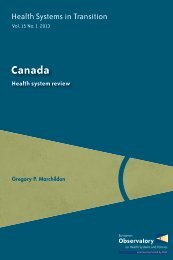Health Systems in Transition - Hungary - World Health Organization ...
Health Systems in Transition - Hungary - World Health Organization ...
Health Systems in Transition - Hungary - World Health Organization ...
Create successful ePaper yourself
Turn your PDF publications into a flip-book with our unique Google optimized e-Paper software.
174<br />
<strong>Health</strong> systems <strong>in</strong> transition <strong>Hungary</strong><br />
• The care coord<strong>in</strong>ator (that is, a group of family doctors, a polycl<strong>in</strong>ic or a<br />
hospital) had no f<strong>in</strong>anc<strong>in</strong>g/budget-hold<strong>in</strong>g responsibilities. Reta<strong>in</strong>ed at the<br />
central level, the f<strong>in</strong>anc<strong>in</strong>g and payment functions cont<strong>in</strong>ued to be carried<br />
out by the NHIFA.<br />
• The budget-hold<strong>in</strong>g function was virtualized. Although care coord<strong>in</strong>ators<br />
were assigned a budget on the basis of an adjusted capitation formula, the<br />
budget amount was not transferred to the care coord<strong>in</strong>ator’s bank account,<br />
but rather served only a basis for comparison: if the actual spend<strong>in</strong>g on<br />
the patients of the population to be cared for was lower than the virtual<br />
budget, only the difference (that is, the sav<strong>in</strong>gs) was transferred to the<br />
care coord<strong>in</strong>ator, which could subsequently use the money to remunerate<br />
doctors (or other health care providers with<strong>in</strong> the model), or to improve<br />
work<strong>in</strong>g conditions, etc.<br />
• Family doctors and not <strong>in</strong>dividual <strong>in</strong>habitants chose whether to jo<strong>in</strong> the<br />
CCS, m<strong>in</strong>imiz<strong>in</strong>g the possibility of risk selection.<br />
• Patients reta<strong>in</strong>ed the right to choose providers freely and could utilize<br />
health care at providers outside the system, but all the payments made to<br />
these providers were deducted from the care coord<strong>in</strong>ator’s virtual budget.<br />
In short, the f<strong>in</strong>ancial responsibility for all episodes of care of a patient <strong>in</strong><br />
the population to be cared for lay with the care coord<strong>in</strong>ator. This limited<br />
<strong>in</strong>centives to maximize sav<strong>in</strong>gs by undertreat<strong>in</strong>g patients.<br />
• Incentives to undertreat patients were also limited by the fact that<br />
providers with<strong>in</strong> the model still had to generate enough revenue by<br />
treat<strong>in</strong>g patients to survive month by month till the end of the year, when<br />
the <strong>in</strong>come from the sav<strong>in</strong>gs could be realized.<br />
• The NHIFA provided access for the care coord<strong>in</strong>ators to the health care<br />
utilization data of patients <strong>in</strong> their respective populations to be cared<br />
for. This database provided the unique opportunity to analyse practice<br />
patterns, protocol compliance, patient pathways at the level of <strong>in</strong>dividuals,<br />
and to evaluate the impact of <strong>in</strong>terventions implemented by the care<br />
coord<strong>in</strong>ator retrospectively.<br />
• The pilot did not change how the system operates. If anyth<strong>in</strong>g went wrong,<br />
the care coord<strong>in</strong>ation function could be withdrawn, without any risk of<br />
people rema<strong>in</strong><strong>in</strong>g without adequate care.<br />
By design, the CCS assumed the cooperation of local health care providers,<br />
that is, the establishment of a functional network of primary care doctors,<br />
outpatient specialist cl<strong>in</strong>ics and hospitals. When family doctor groups served
















